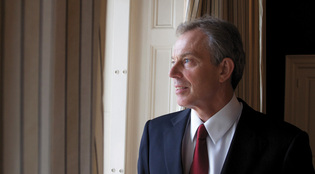 loading
loading
featuresGod and Tony BlairDoes faith have a role in policy? The prime minister says yes.  Mark OstowTony Blair, at Yale in December. View full imageIn March 2003, as the odds of averting war in Iraq dwindled, Tony Blair gave an interview to David Margolick for a lengthy profile in Vanity Fair. Despite the tension mounting in Britain and abroad over the possibility of war, Blair spoke freely to Margolick about many issues, including his friendship with President George W. Bush ’68. But the one topic that seemed to ruffle the otherwise "unflappable" Blair, Margolick wrote, involved religion. When Margolick asked Blair about speculation that he and Bush had bonded over their Christian faith and even prayed together, Blair's press secretary, Alastair Campbell, took control of the interview, asking Blair, "Is he on to God?" Then Campbell cut off his boss and told Margolick: "We don't do God." Britons generally consider faith a private matter, and public discussion of religious devotion by politicians unseemly. As Blair told the BBC last year, "You talk about it in our system, and frankly, people do think you're a nutter." Though Blair seldom let on to constituents, his faith was the powerful, private compass to his life, from his student days at Oxford more than 30 years ago through his lengthy and controversial tenure as prime minister. Now, 18 months after shedding the constraints of high office and voter opinion, Tony Blair has openly made religion the lodestar of this new phase of his life. In the fall, Blair co-taught a course at Yale, with the eminent Christian theologian Miroslav Volf, on the intersecting forces of faith and globalization. The Yale seminar -- the first of three Blair will teach -- follows the unveiling last summer of his main project: the Tony Blair Faith Foundation, which seeks to foster greater understanding among people of various religions by involving them in collaborative projects, such as development efforts and dialogue. The U.S. operations of the foundation will be headquartered at Yale. Blair's goal is one of those simply stated yet vast undertakings: to make religion a force for good as globalization mixes together people of different cultures and faiths. Some people of faith have welcomed Blair's entrance into this arena; others have questioned whether, with his controversial past, he's the right man for the job. But in his classes at Yale and in a recent interview, Blair has begun to give voice to a belief that faith can, and perhaps should, have a role in public decisions. Blair has entered the interfaith movement as it is building momentum. Interfaith efforts began in 1893 with the first meeting on the World's Parliament of Religions. When the parliament closed, the movement "became considerably lower-profile for many decades," according to Gustav Niebuhr, director of the Religion and Society Program at Syracuse University. But the wars in the former Yugoslavia, the last few years of attacks made in the name of Islam, and the rise of fundamentalism across religions have jarred people into action. Some activists feel Blair's involvement gives their efforts a heightened visibility. "I think this movement needed a world leader, and Tony Blair is a world leader," says Eboo Patel, executive director of the Interfaith Youth Core, a nonprofit based in Chicago. "He is one of the type of people who can take the interfaith movement to the next level." Patel has called Blair the Al Gore of the interfaith world. But Blair's past threatens the future he wants to build. Many people, especially many Muslims, cannot forgive him for his role in supporting the Iraq War and for standing by Bush as the conflict worsened. Blair's critics say they doubt his ability to heal rifts between religious communities when the war, they contend, worsened relations between the West and much of the Muslim world. "The word that will be synonymous with Tony Blair is going to be 'Iraq,'" says Sirajul Haq Khan, Secretary for Faith and Interaction with the Ahmadiyya Muslim Youth Association UK. "He needs to legitimize himself. Perhaps some kind of rectification, sort of, 'What I did in the past wasn't entirely correct. I made some mistakes and they shouldn't have happened.' But we haven't heard that yet from him." Given how often members of the public and media have unsuccessfully pressed Blair to repudiate his support of the Iraq War, such a statement is probably not coming any time soon. Asked what he made of the idea that some might see his interfaith efforts as an act of atonement, Blair's eyes widened with surprise, and he laughed. "My basic view is that globalization is a good thing but we need to make it work," he said. "I am fascinated by religious faith but we have to change how the faiths interact with one another. All the work I do is around that notion: how do you make the modern world work?" Yet Blair's interfaith project, if it proves at all successful, might offer the best chance of recasting his legacy in the eyes of his critics. "People with means and connections can get things going, and they can bury some controversial things in the past," says Niebuhr, author of Beyond Tolerance: Searching for Interfaith Understanding in America. "This is a testing time for him, when he has to move from one stage to another and show people he is sincere and committed and can achieve something real." |
|